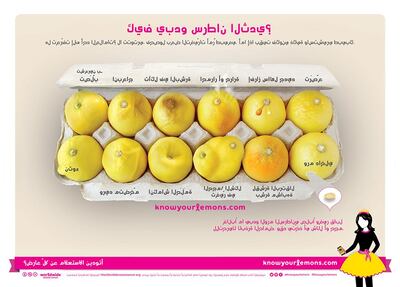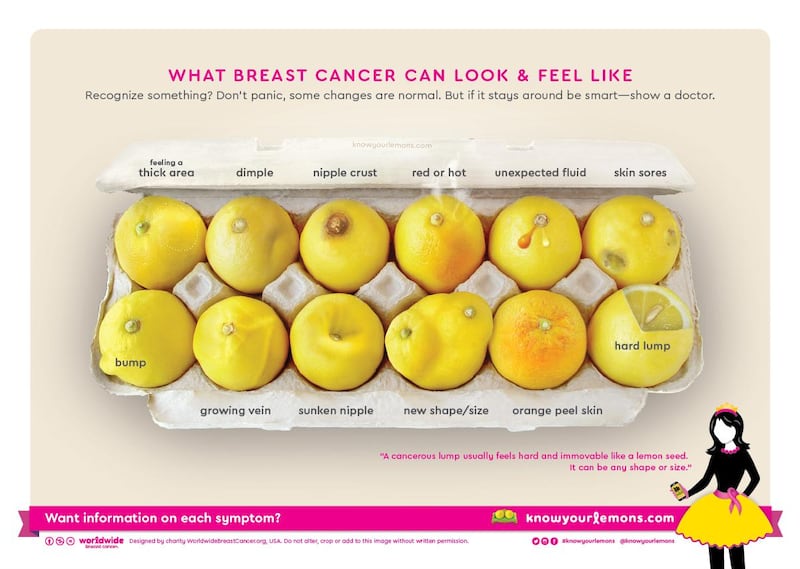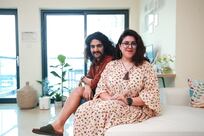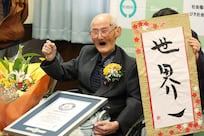Pink ribbons have been ubiquitous in October since it was first designated Breast Cancer Awareness month. But this year one charity is asking the world to share not hearts and ribbons, but lemons. Specifically, a picture of 12 fruits that highlights the early signs of the disease at a glance.
The image was the brainchild of graphic designer and Worldwide Breast Cancer founder Corrine Ellsworth Beaumont. “Breast cancer is a personal issue for me,” she explains. “My first grandmother died at the age of 40 – my father is the middle of five children and he was 12 when she died. My mother’s mother died when she was 61 and I was just starting my Masters degree.”

Realising that both sides of her family had a history of the disease, Ellsworth Beaumont began to research signs of breast cancer, but found the lack of clear information frustrating. “I spent several hours at a cancer library but left with more questions than I’d had going in,” she says. “What does a lump feel like? How do you do self exams? When should I start getting mammograms? There wasn’t any one resource that explained these things.”
One problem in raising awareness of the disease – which kills half a million women globally every year, according to the World Health Organization – is that pictures of breasts can be considered offensive. That is a particular problem in Muslim countries, and on social media sites such as Facebook, which removes images that contain nudity, regardless of the context.
So the young designer began looking for a workaround as her Masters project. “I looked into breast cancer symptoms, and started photographing jugs and cones and melons to explain them. Then one day the idea of a lemon popped into
my head.”
Lemons worked for a number of reasons: bright and cheerful, they are recognisable the world over. They have pores on the surface and ducts inside; there is a kind of “nipple”. Even the seed was a useful metaphor, she discovered. “I spent some time in an imaging centre and asked a mammogram technician if a lump would feel like a grape. She said no, it’s hard like a nut. That was the first time in all my research I’d heard that. A lump that moves around, or comes and goes, is usually harmless. Cancer is hard and immovable, like a lemon seed.”
While Ellsworth Beaumont was refining her idea, a childhood friend who was breastfeeding noticed some redness, tight skin and an inverted nipple on one of her breasts. Her baby refused to feed on that side. “Suzanne’s symptoms were all on my poster, but her doctor said: ‘You’re in your late 20s, we’ll put you on antibiotics for a couple of weeks.’”
By the time Suzanne managed to get a scan, the cancer was in her bones and after seven years of treatment, she died, leaving behind a husband and four children. Still emotional as she talks about it, Ellsworth Beaumont explains that this was the moment she left her job and formally started the charity Worldwide Breast Cancer.
It didn’t take long for her work to have an effect. Within a year, the Know Your Lemons poster – which shows an eggbox filled with 12 lemons, each illustrating a symptom such as redness, hard lumps and new shape/size – had gone viral on social media, with one post by Erin Smith Chieze shared more than 45,000 times.
“In the past few days, I have received quite a few private messages about a ‘game’ going around where you post a heart, then you are secretly supposed to state it is for breast cancer awareness,” Erin Smith Chieze wrote on Facebook earlier this year, explaining that she had seen the box of lemons some time ago.
“In December of 2015 when I saw an indentation that looked like one of those pictures, I instantly knew I had breast cancer... I was diagnosed with breast cancer five days later.” The campaign might have saved her life, she concluded. “We need to give real information, not cute hearts.”
A shocking new survey backs up this point, finding that only 42 per cent of women feel confident that they know what changes in their breasts could signal cancer. Of the 19,000 women in 15 countries surveyed by Avon Products, 25 per cent thought that a lump was the only sign of breast cancer that could be identified without medical equipment. Asked to identify 10 common symptoms of the disease, only 2 per cent could do so correctly.
______________
Read more:
[ Early detection benefits one and all ]
[ Growing numbers of UAE residents attend free breast screenings ]
[ Cancer doctors look to virtual reality for insight into tumours ]
______________
These are the numbers that Worldwide Breast Cancer is working all year round to improve. Its creative lemon pictures – including a cross-section of the fruit designed to help women to check their breasts between mammograms – have been translated into more than 20 languages, including Arabic. They appear on the walls of clinics from London to Jeddah.
“Right now we’re developing an app that is going to make it easy to do self exams at the right time in your menstrual cycle,” Ellsworth Beaumont explains. “If you find something new, you can read more about it, and if you still find it concerning we give you information that you can share with your doctor.” A later version will assess users’ level of risk for the disease as well.
Until then, the charity is urging everyone to share lemons and not hearts this Breast Cancer Awareness Month. “We are aware breast cancer exists; we’ve got that down,” says Ellsworth Beaumont. “But the statistics are shocking for how little people know and our campaign is proven to make a huge impact with that. Now we need to reach as many women as possible.”
To learn more, donate or (from November) download the app, visit worldwidebreastcancer.org






